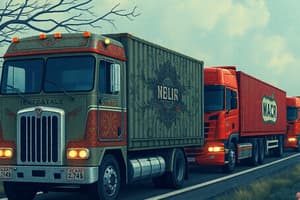Podcast
Questions and Answers
A more realistic representation of the ______ is shown in Figure 1.2
A more realistic representation of the ______ is shown in Figure 1.2
supply chain
A focal firm is shown at the centre of many possible connections with other ______ and customer companies
A focal firm is shown at the centre of many possible connections with other ______ and customer companies
supplier
Materials flow from left (upstream) to right (downstream) in the ______
Materials flow from left (upstream) to right (downstream) in the ______
supply chain
Logistics and the supply chain involve both ______ and downstream processes
Logistics and the supply chain involve both ______ and downstream processes
The supply chain is tiered, in that inbound and outbound can be organised into groups of partners with which we ______
The supply chain is tiered, in that inbound and outbound can be organised into groups of partners with which we ______
Inbound logistics comprises tier 1 suppliers of major parts and subassemblies that deliver directly to the ______
Inbound logistics comprises tier 1 suppliers of major parts and subassemblies that deliver directly to the ______
Tier 2 suppliers deliver to the tier 1s in the ______ logistics structure
Tier 2 suppliers deliver to the tier 1s in the ______ logistics structure
The end-customer is free to place orders when he or she likes, as the system takes over after that in the ______
The end-customer is free to place orders when he or she likes, as the system takes over after that in the ______
The focal firm's internal processes must coordinate with others that are part of the ______
The focal firm's internal processes must coordinate with others that are part of the ______
The supply chain can be seen as a number of processes that extend across ______ boundaries
The supply chain can be seen as a number of processes that extend across ______ boundaries
Study Notes
Supply Chain Management
- The ultimate aim of supply chain management is to integrate inbound, outbound, and internal logistics into a seamless whole, focused on meeting end-customer needs with no waste.
Logistics and Supply Chain
- Logistics refers to the management of materials and information flows.
- Supply chain management views the supply chain as a single entity.
- Logistics is a vital enabler for supply chain management.
Types of Logistics
- Inbound logistics deals with links between the focal firm and its upstream suppliers.
- Outbound logistics refers to the links between the focal firm and its downstream customers.
- Internal logistics deals with planning and control of material flow within the boundaries of the focal firm.
- Physical distribution: the task of distributing products to tier 1 customers (downstream).
- Purchasing and supply deals with a focal firm’s immediate suppliers (upstream).
Supply Chain Costs
- In Tesco's UK supply chain (2010), nearly half of supply chain costs were incurred in-store (46%).
- Supplier delivery to Tesco distribution centre (DC) accounted for 18% of supply chain costs.
- Tesco DC operations and deliver to store accounted for 28% of supply chain costs.
- Supplier replenishment systems accounted for 8% of supply chain costs.
Reducing Supply Chain Costs
- To reduce in-store costs, it is necessary to spend more upstream and downstream to secure viable trade-offs for in-store replenishment.
Studying That Suits You
Use AI to generate personalized quizzes and flashcards to suit your learning preferences.
Description
Test your knowledge on the concepts of inbound logistics, outbound logistics, internal logistics, and supply chain management. Learn about the flow of products from suppliers to end customers and the importance of integrating these processes seamlessly.




